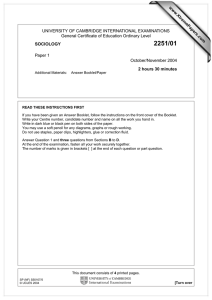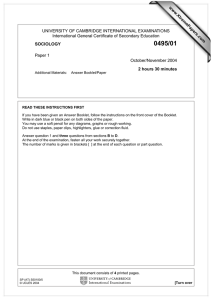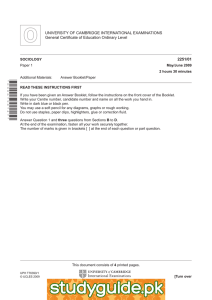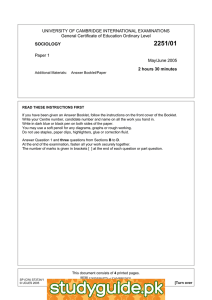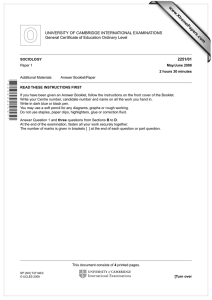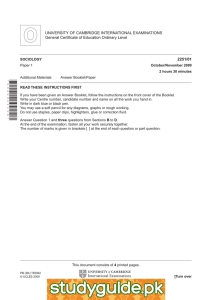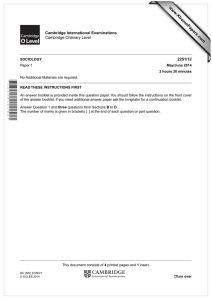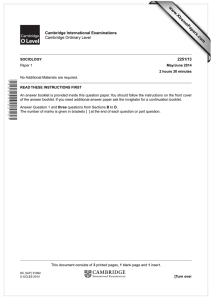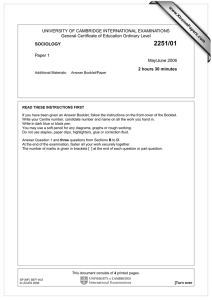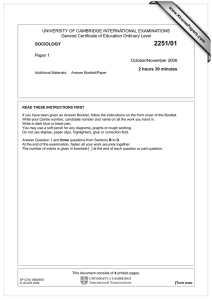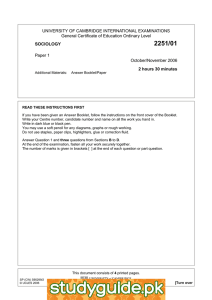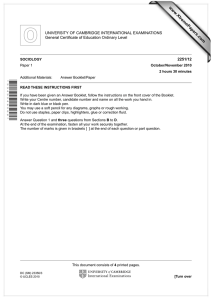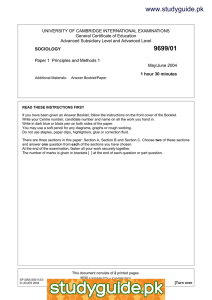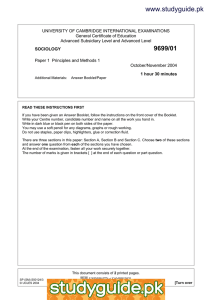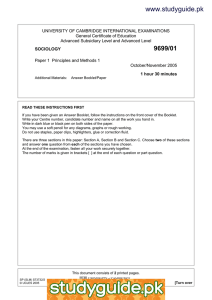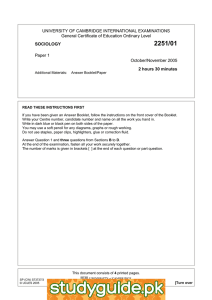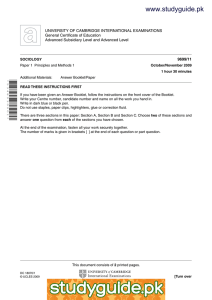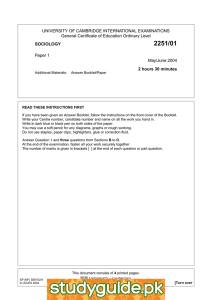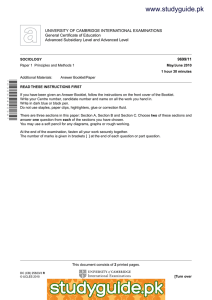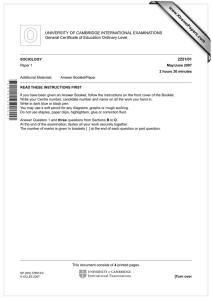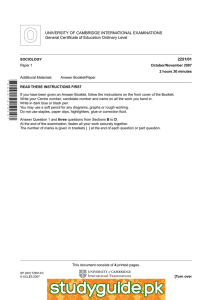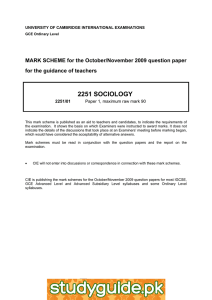2251/01
advertisement
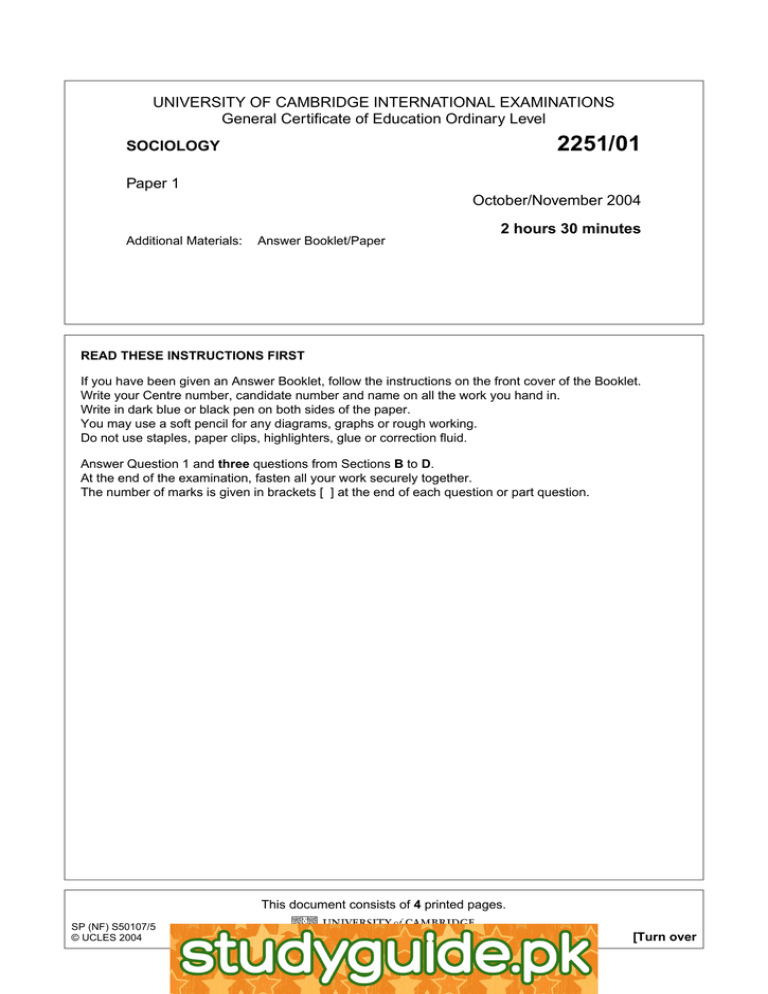
UNIVERSITY OF CAMBRIDGE INTERNATIONAL EXAMINATIONS General Certificate of Education Ordinary Level 2251/01 SOCIOLOGY Paper 1 October/November 2004 2 hours 30 minutes Additional Materials: Answer Booklet/Paper READ THESE INSTRUCTIONS FIRST If you have been given an Answer Booklet, follow the instructions on the front cover of the Booklet. Write your Centre number, candidate number and name on all the work you hand in. Write in dark blue or black pen on both sides of the paper. You may use a soft pencil for any diagrams, graphs or rough working. Do not use staples, paper clips, highlighters, glue or correction fluid. Answer Question 1 and three questions from Sections B to D. At the end of the examination, fasten all your work securely together. The number of marks is given in brackets [ ] at the end of each question or part question. This document consists of 4 printed pages. SP (NF) S50107/5 © UCLES 2004 [Turn over www.xtremepapers.net 2 Section A: Research Methods 1 In order to discover information about society, sociologists have developed a wide range of research methods. Within sociology, however, there is a debate about the best methods to use to capture the truth about society. One group of sociologists (known as positivists) stresses the importance of following the methods of the natural sciences (physics, chemistry, etc.). The other group (often referred to as interpretivists) argues that sociology is slightly different from other sciences, and the task of sociology is to find out how people live and what they think by observing them in their daily life. The positivists tend to use questionnaires, interviews and experiments as their primary research methods. They may also use secondary sources, such as official statistics and historical documents. The observational methods used by interpretivists are of two types: non-participant and participant. Each type of observation has its own advantages and limitations. Participant observation may be overt or covert. (a) In sociological research, what is meant by the following terms: (i) Official statistics [2] (ii) Non-participant observation [2] (iii) Covert participant observation [2] (b) Distinguish between primary and secondary research sources. [4] (c) Describe two possible ethical issues raised by the use of experiments in sociological research. [4] (d) Describe two advantages and two disadvantages of using official statistics in sociological research. [8] (e) Suggest two arguments for and two arguments against the view that sociological research should follow the methods of the natural sciences. [8] © UCLES 2004 2251/01/O/N/04 www.xtremepapers.net 3 Section B: Culture and Socialisation 2 3 As children interact with others during the first years of life they develop a sense of identity. This is part of the process known as socialisation. (a) What is meant by the term socialisation? [2] (b) Describe two ways in which a child becomes aware of his or her gender identity. [4] (c) Explain the importance of play in helping a child develop a sense of identity. [6] (d) Why is socialisation important both for the individual and for society? [8] People within a cultural group tend to share similar beliefs and values. (a) What is meant by the term culture? [2] (b) Describe two reasons why some people within a cultural group may behave differently from the majority of people. [4] (c) Why do people within a cultural group tend to behave in similar ways? [6] (d) What factors may cause a cultural group to change its beliefs and values? [8] Section C: Social Stratification 4 5 A person’s social class is influenced by their occupation, among other factors. (a) What is meant by the term social class? [2] (b) Describe two factors, apart from occupation, that may influence a person’s social class. [4] (c) In what ways does a person’s occupation influence their social class? [6] (d) What factors contribute to changes in rates of social mobility in society? [8] There is significant inequality in the distribution of wealth in modern industrial societies. In many countries the divide between rich and poor grows ever wider. (a) What is meant by the phrase distribution of wealth? [2] (b) Describe two actions that a government can take to reduce inequality in the distribution of wealth in a society. [4] (c) Why do some groups in society have much more wealth than others? [6] (d) What factors contribute to the existence of poverty in modern industrial societies? [8] © UCLES 2004 2251/01/O/N/04 www.xtremepapers.net [Turn over 4 Section D: Power and Authority 6 A feature of democracy is that people have the opportunity for political participation. The activities of political parties and pressure groups are vital in this respect. (a) What is meant by the term political participation? [2] (b) Describe two ways in which a person can seek to influence the government in a democratic political system. [4] (c) Why are pressure groups important in a democracy? [6] (d) To what extent do some groups have more opportunity than others to influence the government in democratic political systems? [8] 7 The German sociologist Max Weber distinguished between ‘power’ and ‘authority’. He identified three types of authority: charismatic, traditional and bureaucratic. (a) What is meant by the term charismatic? [2] (b) Distinguish between the terms power and authority. [4] (c) What are the main differences between Weber’s three types of authority? [6] (d) What factors explain why people usually obey the government in democratic political systems? [8] University of Cambridge International Examinations is part of the University of Cambridge Local Examinations Syndicate (UCLES) which is itself a department of the University of Cambridge. © UCLES 2004 2251/01/O/N/04 www.xtremepapers.net
